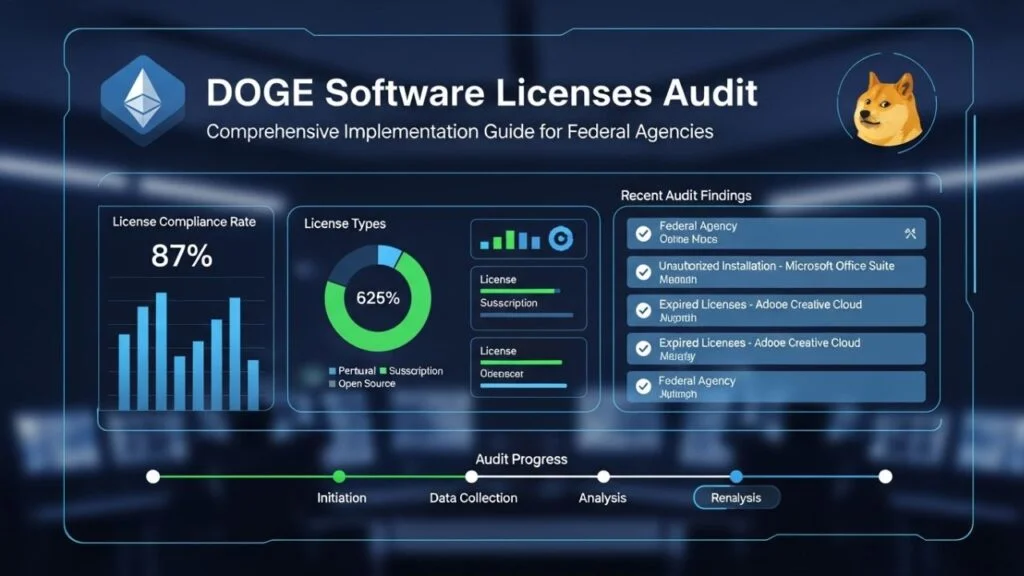Introduction to Doge Software Licenses Audit HUD
The Doge Software Licenses Audit HUD is a pivotal tool designed to enhance compliance and transparency within the realm of software utilization, particularly for organizations that employ Doge software. Software licensing is a critical aspect of modern business operations, as it dictates how software applications can be used, shared, and distributed. Understanding the principles behind these licenses is essential for organizations to ensure they remain compliant with legal requirements and avoid potential financial penalties.
At its core, the Doge Software Licenses Audit HUD serves as a centralized platform for organizations to manage their software licenses effectively. It functions as an auditing system that helps track the software in use, the licensing agreements in place, and any potential discrepancies that may arise over time. By providing a comprehensive overview of software usage versus licensing provisions, the audit HUD facilitates proactive measures to address non-compliance issues before they escalate into significant problems.
The importance of the Doge Software Licenses Audit HUD cannot be overstated. As businesses expand and their software needs grow, so too does the complexity of managing software compliance. An effective audit system reduces the risks associated with non-compliance, which can include hefty fines, legal repercussions, and damage to an organization’s reputation. Moreover, a structured approach to auditing software licenses allows businesses to optimize their software investments, ensuring they are utilizing the tools necessary for efficient operation without breaching licensing terms.
In summary, the Doge Software Licenses Audit HUD represents a crucial element in the overarching framework of software compliance. By understanding its function and significance, organizations can better navigate the complexities of software licensing, thereby protecting themselves against potential legal and financial risks associated with improper software use.
The Benefits of Conducting a Doge Software Licenses Audit
Conducting a Doge software licenses audit offers numerous advantages for organizations that want to maintain compliance while optimizing their software investments. One of the primary benefits is ensuring compliance with licensing agreements, which is vital to avoid potential legal issues. Non-compliance can lead to hefty fines and legal disputes, which can drain an organization’s resources significantly. By regularly auditing software licenses, businesses can identify any discrepancies and rectify them promptly, thereby safeguarding themselves against such risks.
Moreover, a thorough audit can result in substantial cost savings. Companies often purchase software licenses that go unused or are oversized for their needs. By conducting a Doge software licenses audit, organizations can recognize and eliminate unnecessary licenses, negotiate better terms with vendors, and ultimately reduce overall software expenditures. This proactive approach not only helps streamline costs but also ensures that the organization’s budget is allocated more effectively across necessary resources.
In addition to compliance and cost-efficiency, conducting these audits can greatly enhance software asset management. Organizations can gain a clearer view of their software inventory, tracking usage patterns and license expirations. This increased visibility allows businesses to make informed decisions regarding future software purchases, upgrades, or renewals based on actual usage data. Furthermore, aligning software utilization with organizational needs fosters improved operational efficiency, as employees have access to the tools they require without unnecessary complexity.
Ultimately, a systematic approach to software licensing through regular Doge software licenses audits facilitates a more strategic perspective on software management. This practice encourages organizations to optimize their software investments, leverage resources effectively, and maintain compliance, ensuring that they are well-positioned to meet evolving operational demands.

Step-by-Step Guide to Performing a Doge Software Licenses Audit
Conducting a Doge software licenses audit is crucial for maintaining compliance and optimizing software usage within an organization. This guide outlines a systematic approach for performing an effective audit, which can help in identifying license discrepancies while ensuring adherence to licensing agreements.
The first step in the process is preparation. Begin by forming a dedicated audit team that includes IT personnel, compliance officers, and financial analysts. Clearly define the objectives of the audit and establish a timeline for its execution. It is beneficial to familiarize the team with various Doge software licenses and the specific terms attached to each. This foundational knowledge enables insightful discussions throughout the audit.
Next, gather all necessary documentation, including invoices, contracts, and license agreements related to the software in use. Establish a centralized repository where all these documents can be stored for easy access. It is vital to include records of previous audits, if available, as they can provide context for current findings and trends.
In the subsequent step, assess software usage across the organization. Utilize tools that track software installations and usage metrics to gather quantitative data. Compare this information against the purchased licenses to identify any discrepancies. Additionally, engage with departments to understand their actual software needs and whether the existing licenses adequately meet those requirements.
Following the assessment, accurate reporting of findings is essential. Compile the data and prepare a comprehensive report that outlines compliance levels, identifies areas of concern, and suggests actionable recommendations. This report should be reviewed by the audit team and relevant stakeholders before implementation.
Finally, analyze the findings to determine necessary changes for maintaining compliance moving forward. This may involve purchasing additional licenses, reallocating unused licenses, or decommissioning software that is no longer needed. Implementing these changes promptly ensures that the organization remains within the bounds of its Doge software licenses, thus mitigating potential legal risks.
Best Practices and Common Pitfalls in Doge Software Licenses Audits
Executing a successful Doge software licenses audit requires a keen understanding of certain best practices that can streamline the process and prevent common mistakes. One of the most crucial strategies is to establish clear communication channels among all stakeholders involved in the audit. This includes IT personnel, legal experts, and department heads who utilize the software. Ensuring that everyone is on the same page will facilitate a smoother audit process and make it easier to gather necessary documentation.
Another key practice is to maintain accurate and up-to-date records of software licenses. Organizations should routinely track their licensed software inventory, usage, and compliance status. Implementing a robust asset management system can help in maintaining this information accurately and can serve as a reference during the audit. This proactive approach is particularly vital for expressing compliance and understanding which licenses correspond with current installations of Doge software.
doge software licenses audit hud Involving key stakeholders early in the process also aids in identifying potential deficiencies and discrepancies in software usage. This collaborative effort not only improves transparency but can also shed light on licensing agreements that may need renegotiation before the audit begins. Regular training and updates on compliance policies are essential to ensure that all team members are aware of their responsibilities.
Nevertheless, organizations often encounter common pitfalls during audits. These include inadequate preparation, lack of documentation, and miscommunication among team members. To avoid these issues, entities should conduct pre-audit assessments, ensuring all licenses and usage logs are thoroughly reviewed. By understanding these common challenges, organizations can adopt best practices that significantly enhance the efficiency and accuracy of their Doge software licenses audits.
